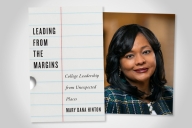You have /5 articles left.
Sign up for a free account or log in.
Yes. Probably not. It depends. If you’re looking for a definitive answer to the question “Should I go to grad school?” a new book by that name might not be for you. And if you’re considering going to grad school to eventually get rich, the book definitely isn’t for you (it says as much in the introduction).
But if you are considering or ever have considered (for yourself or an advisee) attending graduate school – especially in the humanities – as a kind of a calling, then Should I Go to Grad School? 41 Answers to an Impossible Question is worth a read.
The book of essays on the eponymous conundrum, out this week from Bloomsbury, is likely to attract some criticism, given its lack of focus on the high-stakes financial issues surrounding the choice to pursue an advanced degree in the humanities (including the always controversial master of fine arts). But it also offers a deep, textured take on the spiritual question of attending graduate school – one that has taken a back seat, of late, to more practical (and arguably more important) discussions about student debt and the poor academic job market.
“The crisis of higher education is a critical issue these days, but this book is not about plundered personal bank accounts, struggling institutions, or the rise of credentialization – at least not directly,” the book begins. “It’s about what drives people to consider going back to school in the first place, the point at which rational choice intersects with personal predilection, unpredictable circumstances, and anxiety about the future.”
The book doesn’t encourage or condemn academe, but simply lets dozens of academics, writers, and artists -- plus a mixologist and an actor -- share their personal experiences with the choice. (Spoiler alert: James Franco’s answer – as to so many pursuits – is mostly “yes.”) So while it is not a practical guide, if you’re thinking about graduate school, someone’s story might resonate. And if you’ve already made the choice, someone’s story might bring you back to that proverbial fork, for better or worse.
Nancy Bauer, dean of academic affairs for arts and sciences and an associate professor of philosophy at Tufts University, wrote that her path to graduate school was hardly clear.
“I was a horrible – horrible – undergraduate student, the kind of student that, as a professor, I now loathe and shun,” Bauer wrote in her essay. More interested in working at her student newspaper, Bauer said she asked clever questions and pulled all-nighters to make it through college, and immediately pursued a job in journalism upon graduation.
But soon, she said, the tragic stories she was covering on Cape Cod for The Boston Globe started to weigh on her (as did the sexism of the newsroom, but she didn’t quite know it then). Covering the horrific death of an infant was the end of her budding career, and Bauer went to work at a local hospital instead, editing publications. She said the building buzzed with complicated, ethical questions, and so she was thrilled when a hospital employee suggested that she apply to a graduate program in medical ethics at Harvard University (where she eventually transitioned to a program in philosophy).
“There I learned that had really been gripping me from my reporter days on was the fatefulness of the categories of our experience, that is, what we call things,” she wrote. “Why do we conform ourselves to our concepts rather than the other way around? These became, and still are, questions I genuinely call my own.”
In another essay, Duncan Watts, a former faculty member at Columbia University known for his work on small-world networks and current principal at Microsoft Research, also talks about the importance of finding “your question.” (You’ll know it, he says, when you’re unable to articulate why it’s so interesting.)
Watts, who attended graduate school after a stint in the Australian military, doesn’t necessarily recommend going to graduate school. He compares one’s odds of having a “wildly successful academic career” to those of becoming a movie star. (Not the only time that comparison appears in the book, it turns out. Other common themes include living, with little to no money, in New York in one’s 20s, making graduate school a seemingly prudent financial choice by comparison.) But Watts also compares the thrill of occasional breakthroughs in research to that of mountain climbing or a similarly adventuresome activity.
“There’s no physical danger, of course, but it’s the same sense of pitting yourself – in this case, your mind – against the world, of pushing yourself to your limits and then realizing your goal, of experiencing the beauty of the world anew,” Watts wrote. “You don’t have to go to grad school to experiences this feeling, but if intellectual adventure is your thing, there’s a chance you can find it there. I hope you do.”
For Bauer, “the best reason to go to the kind of grad school that’s not going to make you rich is that it has turned out in your case that taking yourself seriously as a human being requires it.”
But for some of the essay’s authors, it doesn’t. Some thinkers, writers and artists say they didn’t feel lives of the mind could only – or best -- be shaped by the academy.
Ron Rosenbaum wrote about his decision to leave Yale University’s esteemed graduate program in English for a successful career as a writer and critic. Then, as now, he says, graduate school was full of disappointing encounters with scholars who are so much better in print, and literary debates that he says take the life out of the literature.
A chance viewing of Peter Brook’s staging of A Midsummer Night’s Dream in England shortly after he left graduate school affirmed his choice, and inspired his book The Shakespeare Wars, he says. “Until then, I’d never understood the power of the spell Shakespeare could cast on the stage rather than the page [….] It was a play about a love potion that was itself a kind of lifelong love potion. It was an experience that I wouldn’t trade for an entire graduate school education.”
Eben Klemm, an internationally renowned mixologist, was working at Massachusetts Institute of Technology’s Whitehead Institute and considering applying for graduate school there when he “sold my house and moved to New York to seek my fortune as a bartender.” Klemm knew he didn’t have that “one question” he was willing to spend his life pursuing, and wanted to try his hand at something totally different. The move evolved into a successful career (which, he notes, isn’t so far from his science roots).
“Anything can become a serious, almost academic pursuit if you care to work at it deeply and honestly (or dishonestly) within a community of similar individuals who choose to care about it as much as you do,” he says.
The book is edited by Jessica Loudis, Bosko Blagojevic, John Arthur Peetz and Allison Rodman. They began working together in 2012 through Platform for Pedagogy, which organizes and promotes free intellectual and cultural events in New York City. The book grew out of discussions about the possibility of going back to school, or not. All are recently out of college and worked in various fields at the time. They say they cast a wide net in soliciting essays to broaden the conversation about graduate school.
Loudis called the question of intended audience a “tricky one.” The editors asked contributors to write their pieces with a “smart, recent college grad in mind.”
So in one sense, she said, “the book is pitched to that demographic, but I think it's just as pitched to people who are already in grad school or have spent significant amounts of time either in it or having considered it.”
Loudis added: “We tried to touch on as many grad school-related existential crises as possible in the book, so hopefully there's something for everybody.”
Bauer said she wanted to contribute to the book “because of the editors’ commitment to choosing contributors in a wide variety of creative fields.” And personally, she said, “Two of my children were juniors in college when the editors approached me for a contribution, and they were both struggling with the book’s title question and — now one year out of college — still are.”
Stephen Squibb, a graduate student in English at Harvard University, wrote that his choice to attend graduate school was one of those that seemed relatively sane after years spent working odd jobs in New York City to supplement work in the theater scene there. (Although Squibb says in a footnote that an a graduate degree in the humanities should only be pursued if fully funded.) He said he wanted to contribute to the book because “grad school is an experience that is both common – in that many people go, or have gone, or have thought about going – and entirely singular, in that no two encounters are alike.”
Grad school is kind of “like sex,” in that it’s “a topic about which it is as difficult to be uninteresting or incorrect as it is to be satisfying or authoritative” he said. “These are good odds for a writer.”
Of the book as a whole, Squibb said he was surprised how much he liked it – and then surprised at his surprise.
Loudis said early feedback on the book has “generally been positive.”
“This is obviously a very personal and in some cases touchy subject, but the intention was never to denigrate a system that is in many ways broken,” she said. “We wanted to move the conversation about grad school away from the 'money vs. value of the humanities' rut it has fallen into, and to do so with as much honesty and generosity as possible. I think people have responded well to that.”
Karen Kelsky, a former tenured professor of anthropology turned academic job consultant, often gets asked “Should I go to grad school?” by prospective clients and readers of her blog, The Professor Is In. Her approach tends to be brutal honesty, as in a recent post called “Should you go to graduate school?”
“Understand that if you do it, you almost certainly will not get a full time permanent tenure track academic job at the end that will even begin to make back the money you invested into the program,” Kelsky wrote. “Even if you get a permanent job, the pay scale of faculty is low enough in most colleges and universities outside the elite schools, that you will be unable to pay off your undergraduate student debt or readily meet basic expenses like child care or medical expenses.”
In an interview, Kelsky said she hadn’t read the new book, but that going to graduate school must be both a financial and spiritual choice. The “ideal” of higher education – that it can be approached as a kind of calling – has always been about money, she said -- but it's only recently that the "financial foundation has evaporated."
Kelsky said that wasn’t fair, but compared going to graduate school with having a vacation home in the Bahamas -- something everyone should potentially enjoy, but not all can.









